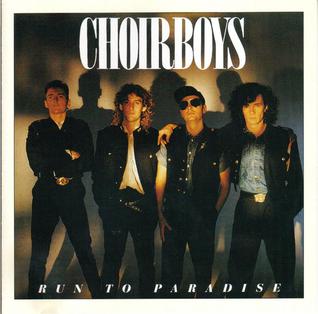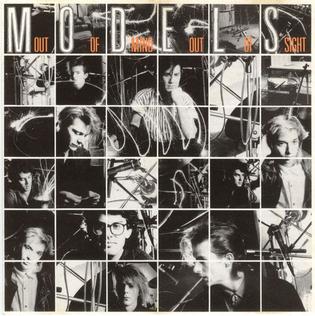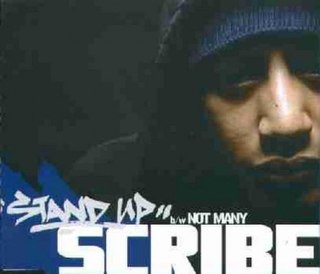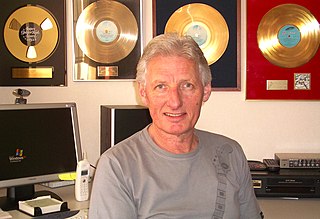
Crowded House are a rock band, formed in Melbourne, Australia, in 1985. Its founding members were New Zealander Neil Finn and Australians Paul Hester (drums) and Nick Seymour (bass). Later band members included Neil Finn's brother, Tim Finn, and Americans Mark Hart and Matt Sherrod.

David Bowie is the self-titled debut studio album by English musician David Bowie, released on 1 June 1967, on Deram Records.

"Dancing in the Street" is a song written by Marvin Gaye, William "Mickey" Stevenson and Ivy Jo Hunter. It first became popular in 1964 when recorded by Martha and the Vandellas whose version reached No. 2 on the Billboard Hot 100 chart and peaked at No. 4 in the UK Singles Chart. It is one of Motown's signature songs and is the group's premier signature song. A 1966 cover by the Mamas & the Papas was a minor hit on the Hot 100 reaching No. 73. In 1982, the rock group Van Halen took their cover of "Dancing in the Street" to No. 38 on the Hot 100 chart and No. 15 in Canada on the RPM chart. A 1985 duet cover by David Bowie and Mick Jagger charted at No. 1 in the UK and reached No. 7 in the US. The song was also covered by Cilla Black, The Kinks, The Everly Brothers, Grateful Dead, The Struts and Black Oak Arkansas.
Stephen Ellis "Steve" Gilpin was a New Zealand-born rock music vocalist and a founder of new wave band Mi-Sex.

"Let's Dance" is a song recorded by English singer David Bowie from his album of the same name, Let's Dance (1983). The song was written by Bowie and produced by Nile Rodgers. It was released as the album's first single in 1983 and went on to become one of his biggest-selling tracks. Stevie Ray Vaughan played the guitar solo at the end of the song.

Mi-Sex is a New Zealand new wave rock band that was originally active from 1977 to 1986. Led by Steve Gilpin as vocalist, Kevin Stanton as guitarist and songwriter and Don Martin as bassist. They provided top ten singles, "Computer Games" in October 1979 and "People" in 1980. Their first two albums both reached the New Zealand top 10, Graffiti Crimes and Space Race. They were known for their cutting edge production and dynamic live shows. Gilpin died in January 1992, two months after a serious car accident from which he never recovered. Mi-Sex have periodically reformed, including in 2011 with Steve Balbi (ex-Noiseworks) on lead vocals. Stanton died on 17 May 2017.
Dimmer was the name under which New Zealand musician Shayne Carter recorded and played music from 1994. It began as an umbrella name for jam sessions and home recordings, with various members and guests, but became a more settled four-piece rock band. 41 musicians played a part in Dimmer over 18 years, with Carter the only permanent fixture.

Scented Gardens for the Blind is the second album by New Zealand group Dragon released in February 1975 on Vertigo Records before they relocated to Australia in May. Scented Gardens for the Blind, along with their first album Universal Radio, is in the progressive rock genre—all subsequent albums are hard rock/pop rock. "Vermillion [sic] Cellars" was released as a single in March and was followed by non-album singles, "Education" in May and "Star Kissed" in August but neither albums nor singles had any local chart success.

"Don't Change" is a song by Australian rock band INXS. It was released as a single from the album Shabooh Shoobah in October 1982. It has been described as the band's first international single. "Don't Change" peaked at number 18 on the Australian Singles Charts and reached number 80 on the Billboard Hot 100 and number 17 on the Billboard Top Tracks chart.
The Yandall Sisters were a popular New Zealand-born Samoan all-female singing group of the 1970s, who made a major contribution to music in New Zealand. The members of the group were Caroline, Mary and Adele Yandall, and later younger sister Pauline Yandall.

"Run to Paradise" is a single by Australian hard rock group The Choirboys which reached No. 3 on the Australian Kent Music Report Singles Chart in October 1987. It was Australia's 11th highest selling single of the eighties. The related Big Bad Noise album peaked at No. 5, it went double platinum and ranked No. 21 for 1988 in Australia. In New Zealand, "Run to Paradise" attained No. 13 on the RIANZ Singles Chart. Released in the United States in 1989, it appeared on the Billboard Hot 100 and Mainstream Rock charts. The song was re-worked for a 2004 release credited to Nick Skitz vs. Choirboys and reached No. 16 on the ARIA Singles Chart.

Out of Mind, Out of Sight is the fourth studio album by Australian new wave rock band Models, it was their most successful album and peaked at No. 3 on the Australian albums chart. It was released in August 1985 by Mushroom Records with Nick Launay, Reggie Lucas and Mark Opitz producing.

"Not Many" is a hip hop single by New Zealand rapper Scribe, taken from his debut album, The Crusader. It was released as a double A-side with "Stand Up".
She Speeds is a song by Dunedin, New Zealand band Straitjacket Fits. The song was released on their debut 'Life in One Chord EP' in 1987. The EP was recorded at the Lab Studios in Auckland, New Zealand and reached number 10 on the NZ Top 40 charts later that year. A video was filmed for She Speeds for just $250 by Johnny Ogilvy and the song quickly became a cornerstone of their live sets. The song would later be dropped from their sets as the band moved away from its early sound.

"Nature" is a 1969 single by New Zealand band The Fourmyula. The song peaked at number one in the New Zealand singles chart in 1970, won the APRA Silver Scroll songwriting award the same year, and in 2001 was voted the top song in APRA New Zealand's Top 100 New Zealand Songs of All Time. "Nature" was notably covered in 1992 by New Zealand rock band The Mutton Birds.
Joel Little is a New Zealand record producer, musician and Grammy Award-winning songwriter. He is best known for his work as a writer and producer with artists Lorde, Taylor Swift, Broods, Sam Smith, Imagine Dragons, Ellie Goulding, Khalid, Elliphant, Sam Smith, Jarryd James, Shawn Mendes, Marina Diamandis and Jonas Brothers.

Glyn Tucker Jnr was a leading figure in the New Zealand music industry for more than twenty years. Following an early career as a singer/songwriter in The Gremlins (1965–1968) he founded Mandrill Recording Studios in Auckland in 1975, and produced and engineered hundreds of New Zealand songs in the late seventies, eighties and early nineties.
RTC is a New Zealand record label which licensed recordings from overseas Independent labels in the United States and in the United Kingdom.















